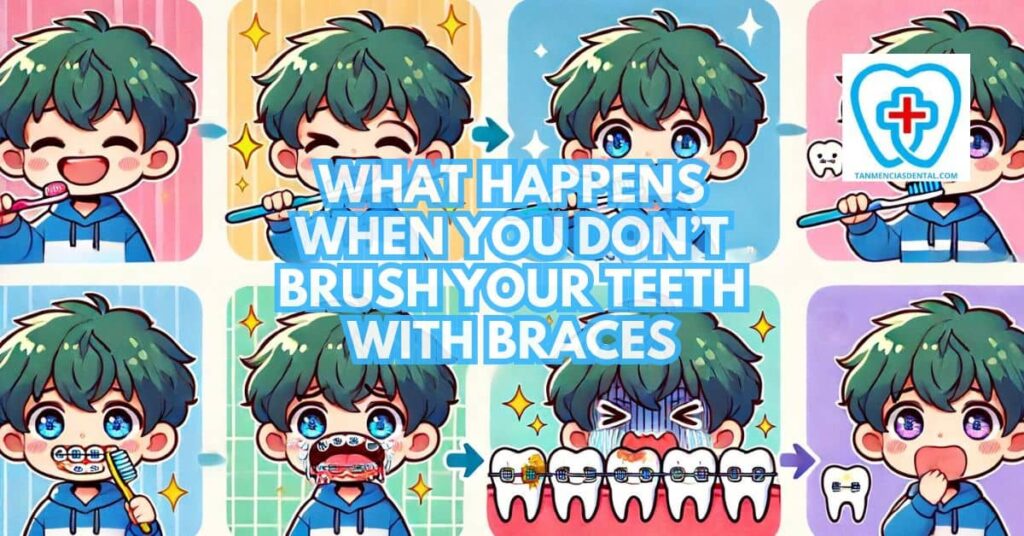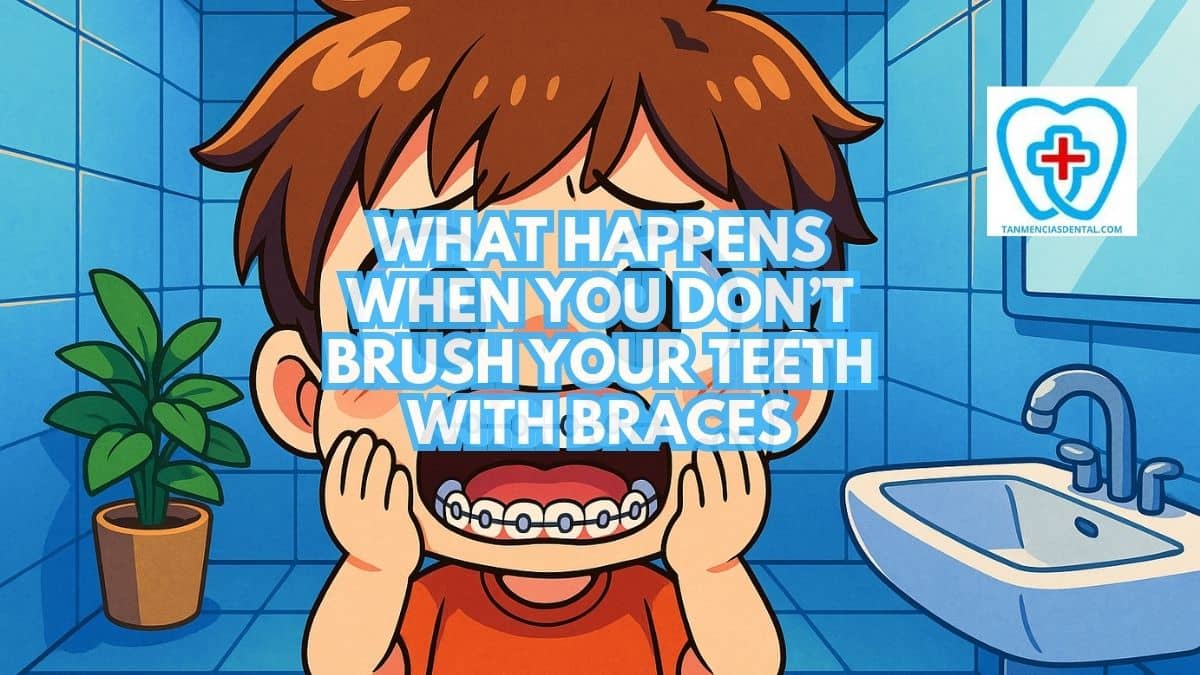Braces make it harder to clean your teeth because they trap food and bacteria more easily.
If you don’t brush properly, many problems can develop, such as plaque buildup, gum swelling, and even tooth decay.
These issues can slow down your treatment and make wearing braces more painful or difficult.
We’ll explain what happens when you don’t brush your teeth with braces and why keeping your mouth clean is so important.
Knowing the risks can help you take better care of your teeth while wearing braces.
1. How Braces Become Traps for Food and Bacteria
Braces have many small parts, like brackets and wires, that create extra spaces where food can easily get stuck.
These tight spots make it harder to clean your teeth and braces properly, even if you brush regularly.
When food stays in these areas, it mixes with saliva and bacteria to form plaque, a sticky layer that can coat your teeth.
If you don’t remove plaque every day, it can lead to cavities, swollen gums, and bad breath.
Over time, this buildup may harm your teeth and braces, causing delays in your treatment.
To keep your teeth healthy, it’s important to brush after every meal and use special tools like interdental brushes or water flossers.
Your orthodontist can also show you the best ways to clean your teeth and braces to avoid problems.
🦷 How Teeth-Whitening Lights Brighten Your Smile Explained
2. From Plaque Buildup to Enamel Demineralization
Plaque forms quickly around braces if teeth are not brushed regularly.
The acids produced by the bacteria in plaque can start to demineralize the enamel, the hard outer layer of your teeth.
This demineralization weakens the enamel, making it more susceptible to decay and cavities.
In time, this can lead to white spots on the teeth, which are early signs of enamel damage.
Regular brushing helps to remove plaque and protect the enamel from demineralization and decay.
🦷 Closing Teeth Gaps: Your Complete Guide to Treatment Options
3. Unbrushed Braces: A Recipe for Cavities and Tooth Decay
When you don’t brush well with braces, food and bacteria build up around the brackets and wires.
Bacteria feed on leftover food, especially sugars, and make acid that weakens the enamel, the hard outer layer of your teeth.
This damage can quickly lead to cavities, especially in the small spaces around the brackets where brushing is harder.
Cavities can cause pain and may require fillings, which can delay your orthodontic progress.
To avoid this, it’s important to brush carefully after every meal and floss daily to reach between your teeth.
You should also rinse your mouth with water if you can’t brush right away to help wash away food and bacteria.
Taking time to rinse and clean properly will help take care of your teeth and keep your smile healthy during your braces journey.
🦷 More Than Fresh Breath: Surprising Benefits of Brushing Your Teeth
4. Painful Mouth Sores: A Hidden Problem from Not Brushing with Braces
When you don’t brush your teeth with braces, food and plaque can get stuck in hard-to-reach places.
This buildup can rub against the inside of your cheeks, lips, and gums, causing irritation.
The constant rubbing may lead to painful sores or ulcers inside your mouth.
These sores can make it hard to eat, talk, or even smile comfortably.
Keeping your mouth clean helps prevent these problems and makes wearing braces easier.
🦷 The Science Behind Teeth-Whitening Machines and How They Work

5. Gum Inflammation (Gingivitis): An Irritating Consequence
Neglecting to brush can cause your gums to become inflamed, a condition known as gingivitis.
Gingivitis is marked by red, swollen, and bleeding gums, which can be both uncomfortable and painful.
This inflammation occurs because plaque and bacteria accumulate along the gum line, irritating the gums.
If left untreated, gingivitis can worsen and lead to more serious gum diseases.
Regular brushing and flossing are essential to remove plaque and prevent gingivitis.
🦷 Best Electric Toothbrushes for Sensitive Teeth: Gentle Care for Your Smile
6. Uncontrolled Gingivitis: The Road to Gum Disease (Periodontitis)
If gingivitis is not managed, it can progress to periodontitis, a more severe form of gum disease.
Periodontitis affects the structures supporting your teeth, including the gums, periodontal ligament, and jawbone.
This advanced gum disease can cause the gums to recede and pockets to form between the teeth and gums, trapping more bacteria.
With time, periodontitis can lead to tooth loss if left untreated.
Maintaining good oral hygiene with braces is crucial to preventing the progression from gingivitis to periodontitis.
🦷 Same-Day Dental Implants: How You Can Get a New Smile Fast
7. Fresh Breath Takes a Backseat: Bad Breath (Halitosis) Sets In
Not brushing with braces can cause persistent bad breath, known as halitosis.
The trapped food particles and bacteria produce foul-smelling compounds that contribute to bad breath.
This issue can be embarrassing and affect your confidence and social interactions.
Regular brushing and flossing help to remove food particles and bacteria, preventing the buildup of these odor-causing compounds.
Good oral hygiene is essential for keeping your breath fresh while wearing braces.
🦷 Managing Swelling After Tooth Extraction: Easy Home Remedies and Tips
8. Beyond Brushing: Avoiding Enamel Staining
Plaque that remains on teeth can cause stains, especially around braces.
These stains often appear as white spots or discolored areas once the braces are removed.
The longer plaque stays on your teeth, the more likely it is to cause enamel staining.
Regular brushing helps to prevent plaque buildup and the subsequent staining of your teeth.
Using fluoride toothpaste can also help strengthen enamel and prevent stains.
🦷 How to Clean Your Teeth Without a Toothbrush: Simple Tips for Everyone
9. Braces and Oral Hygiene Neglect: A Longer Treatment Awaits
Poor oral hygiene can extend the time you need to wear braces.
Issues like tooth decay, gum disease, and enamel demineralization can delay the progress of your orthodontic treatment.
These problems may require additional dental treatments, which can prolong the overall duration of wearing braces.
Maintaining clean teeth and gums is essential to ensuring a smooth and timely orthodontic treatment.
Regular dental checkups can also help monitor and address any issues promptly.
🦷 Top Soft Foods to Eat After Tooth Extraction for Comfort and Healing
10. Difficulties Removing Braces: When Neglect Makes Things Worse
Neglecting oral care can make removing braces more challenging and complicated.
Dental issues like severe decay or advanced gum disease must be addressed before braces can be safely removed.
These problems can result in additional treatments, such as fillings, deep cleanings, or even tooth extractions.
This not only prolongs the orthodontic process but also increases discomfort and costs.
Maintaining good oral hygiene throughout your treatment ensures a smoother and easier braces removal.
🦷 Why Smoking After Tooth Extraction Slows Healing and Increases Infection Risk
11. Brushing, Flossing, and Winning: Maintaining Oral Hygiene with Braces
Brushing and flossing regularly are crucial for preventing the problems associated with braces.
A thorough oral hygiene routine includes brushing after every meal, using a fluoride toothpaste, and flossing at least once a day.
Special tools like interdental brushes and water flossers can help clean around brackets and wires more effectively.
Regular dental checkups and cleanings are also essential to monitor oral health and address any issues early.
By maintaining good oral hygiene, you can ensure that your braces treatment is effective and your teeth remain healthy.
🦷 Top-rated Dentists in Marikina
👨⚕️ Conclusion
Brushing your teeth with braces is crucial for maintaining oral health and preventing a range of problems.
It helps avoid cavities, gum disease, bad breath, and enamel staining, ensuring your teeth remain healthy during and after treatment.
Good oral hygiene habits also contribute to a shorter and more effective orthodontic process.
Regular brushing, flossing, and dental checkups are essential for achieving the best results from your braces.
Prioritizing your oral care ensures a bright and healthy smile once your braces are removed.
😊 Self-Promotion
Visit Tan-Mencias Dental Clinic in Parang, Marikina City, for all your dental needs.
Our friendly and professional team is dedicated to providing top-notch dental care in a welcoming environment.
You can reach us by calling 9171451074, sending a message through our Facebook page, or using our website’s contact form.
We’re here to answer any questions or concerns you may have.
Experience the difference at Tan-Mencias Dental Clinic; your smile is our priority!

